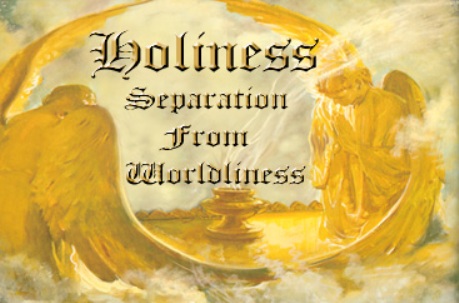
Ezekiel 42:1-43:27 ~ James 5:1-20 ~ Psalm 119:1-16 ~ Proverbs 28:6-7
~ Click here to read today's Scripture on BibleGateway.com ~
~ Listen to today's Scripture on DailyAudioBible.com (podcast) or OneYearAudioBible.org ~
Old Testament - Ezekiel chapter 42 continues the description of the temple in Ezekiel's vision and the dimensions. In this chapter we learn about the rooms for the priests of the temple. The interesting thing for me, as I was reading this chapter today, is that my mind wandered a bit and wondered if maybe somehow this was / is a heavenly temple that Ezekiel was describing? I'm not sure. I have so much more to learn about the temples. But, it's interesting to think if maybe somehow we might see something like this temple in heaven? An interesting thought at least for me to ponder. However - the tricky thing is that in chapter 43 there are descriptions of sacrifices for the altar in this temple. And of course Christ was the final sacrifice for our sins - so there is no need for the old covenant sacrifices. So, this could certainly dash my imagination of this being a heavenly temple we'll see some day. Though - I did read somewhere that if this is a heavenly temple, the sacrifices described in chapter 43 may be "memorials" or ceremonial - but not required, as they were in the old covenant. I don't know... fascinating stuff to ponder however! Below is an artist's rendition of "Ezekiel's Temple":

Back to how all this might apply to our lives today. Verse 20 in chapter 42 stood out to me: "So the area was 875 feet on each side with a wall all around it to separate the holy places from the common." The last part of that verse stands out - to separate the holy places from the common. I wonder about that in our lives - do we do anything that separates the holy from the common in our own lives? Do we need to? My thought here is that if we don't allow for some "holy places" to appear in our lives, might we just settle for common places throughout our lives? A Holy Place for us might be 5 minutes of prayer. Or 15 minutes of reading the Bible. Or going to a church service. Or listening to worship music. Or not scheduling anything one day a week, so we can take a Sabbath day of rest. What are you doing to create some Holy Places in your life?

Chapter 43 is incredible with God's return to the temple. I love this verse - "And this is the basic law of the Temple: absolute holiness!" Absolute holiness. Okay - so this is not something we are going to see or "achieve" this side of heaven. It's impossible for us to be absolutely holy on this earth. Only Jesus was absolutely holy and sinless. However, I think the call for our eternal lives is absolute holiness. So, know that faith in Jesus will ultimately lead you in this direction - and I do believe we can grow in holiness in this life. God's grace gives ultimate absolute holiness in heaven. Do you want absolute holiness? Are you moving toward absolute holiness in your life today? Do you also realize you won't reach absolute holiness this side of heaven? But, yet, do you still desire absolute holiness someday?

Verse 21 in this chapter is a foreshadowing of Jesus' death on the Cross at Mt. Calvary: "Then take the young bull for the sin offering and burn it at the appointed place outside the Temple area." How does this apply to Jesus' death on a hill outside of Jerusalem's city gates? This is best explained in Hebrews chapter 13 verses 11-13 as follows: "The high priest carries the blood of animals into the Most Holy Place as a sin offering, but the bodies are burned outside the camp. And so Jesus also suffered outside the city gate to make the people holy through his own blood. Let us, then, go to him outside the camp, bearing the disgrace he bore." Powerful... Will you walk with Jesus outside the city gates of Jerusalem? Up to Mt. Calvary? Will you follow Jesus all the way up that hill?

New Testament - Today we wrap up the book of James. This has been such a powerful book for me to read these past few days! I am convicted and challenged by this book, which is wonderful. Today in chapter 5, verse 5 stands out: "This treasure you have accumulated will stand as evidence against you on the day of judgment." This reminds me of the scene at the end of the movie "Schindler's List" where Oscar Schindler breaks down crying when the war is over - and after he has saved so many lives - and yet he cries out - "This gold pin - this pin could have saved a life! This car.... could have saved 10 lives!" This scene - and this verse - makes me ask myself if I am using my finances wisely? Am I investing in others? Are my luxuries taking away from other's very lives? Am I accumulating treasure when I could have been serving others? I cannot encourage you enough to watch this scene in Schindler's List again if you haven't seen it in a while. Every time I watch this scene something happens to my heart that only God can explain... it changes me...

Verse 9 stands out: "Don't grumble about each other, my brothers and sisters, or God will judge you." This is such a great reminder of Jesus' call to not judge others! Don't grumble about others. How often do we grumble about others? Are we grumbling about someone currently? Is this a healthy practice? By the way, I have been bad about grumbling about others recently - in fact, I almost got sideswiped on a freeway recently by a guy who was not paying attention to where he was going. In all honestly, I have no idea how we avoided not hitting each other, but for the grace of God. I was so shook up by the near miss I was "grumbling" big time about this guy's carelessness. Interestingly and thankfully I was not cussing at him nor giving him bad gestures, but I was grumbling in my heart about how not smart I thought he was - and I immediately caught myself and asked God to forgive me for this sin. And I believe He did. Let us not grumble in our hearts about others. It is a sin. Let us stay away from grumble corner in our lives! :)

The first half of verse 16 is so true - "Confess your sins to each other and pray for each other so that you may be healed." Is there someone in your life you can confess your sins to? Someone you can ask to pray for you? Do you believe this practice will heal you of that sin?

And the last half of verse 16 also is amazing to remember - "The earnest prayer of a righteous person has great power and wonderful results." Are you praying for others? Earnestly? Do you believe prayer has great power and that God listens and can bring about wonderful results?

Psalms - Today we begin Psalm 119, the longest Psalm and chapter in the Bible! This Psalm is a beautiful meditation on God's Word and how it helps us stay pure and grow in faith. Almost every verse in this Psalm mentions God's Word. I pray that this Psalm is encouraging to you as you read through the One Year Bible!

Today in Psalm 119 verse 11 we read: "I have hidden your word in my heart, that I might not sin against you." Have you hidden God's word in your heart? So that you might not sin against God? Do you realize that all sin is indeed a sin against God? Are you memorizing Scripture on a regular basis? And, more importantly, reflecting on Scripture? Check out this link for some great free online resources to help you memorize Scripture - http://www.memoryverses.org/

Proverbs - Proverbs 28 verse 6 teaches us today: "It is better to be poor and honest than rich and crooked." I have often paraphrased this proverb in this way - "It is better to be poor and happy than to be rich and miserable." Though, I think the Proverb reads better and has more truth in the way it is actually written in the Bible. "Honest" is better than "Happy"... Actually, the more I think about this, I think that honesty actually will lead to happiness. If you are honest with yourself and others, I do think you'll be happier obviously than if you are dishonest with yourself and others. To take this a step further, and to reflect on the "absolute holiness" verse in Ezekiel today, I might even paraphrase this Proverb to say "It is better to be poor and holy and than rich and un-holy." Not sure if this works? I do want to say that I don't think being rich means you'll be crooked or miserable or un-holy. But, I think there is so much truth to Jesus' teaching in Matthew 16:26 - "For what is a man profited, if he shall gain the whole world, and lose his own soul?" We need to be careful around too much money or too much power or of course too much (any?) pride. Too much can distract us from God... In fact, whether we're rich or poor, I think if we don't always keep in mind that absolutely everything we have comes from and belongs to God then we can indeed become "blinded" by money in one way or another...

YouTube: As I reflect on the ending of Schindler's List in the New Testament blog comments today, here's the beautiful ending of the movie that I refer to:
http://www.youtube.com/watch?
Do you need our Saving God? Click here and get to know him!
Please join us in memorizing and meditating on a verse of Scripture this week: "Do not merely listen to the word, and so deceive yourselves. Do what it says." James 1:22 (NIV)
Comments from You: What verses or insights stand out to you from today's readings? Please post up by clicking on the "Comments" link below!
Grace, love, peace, and joy!
Mike














